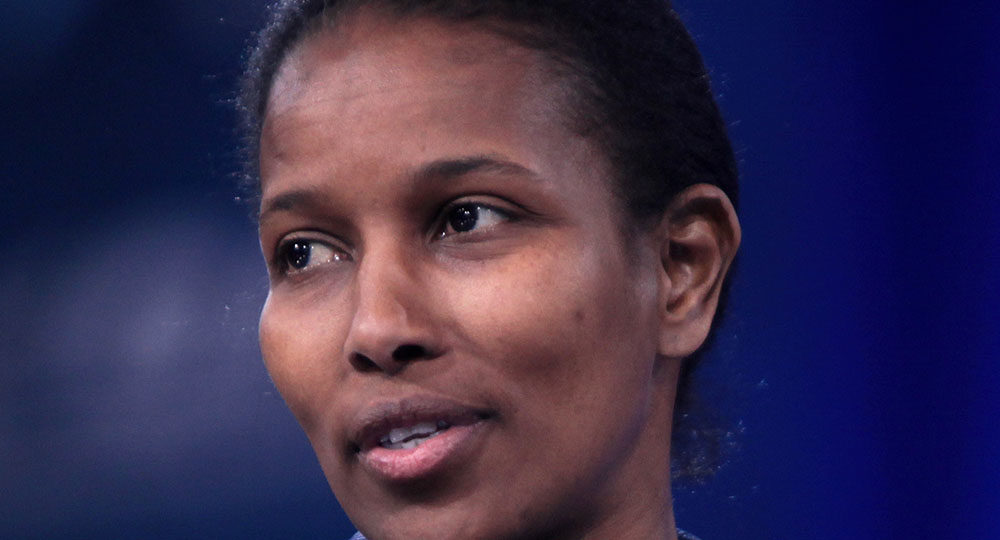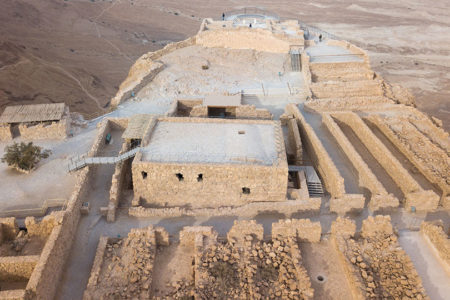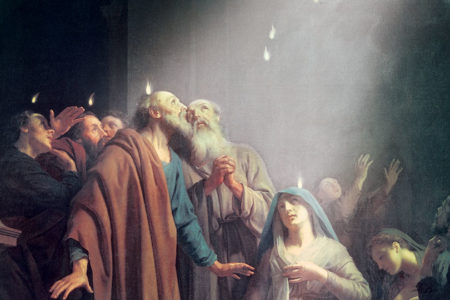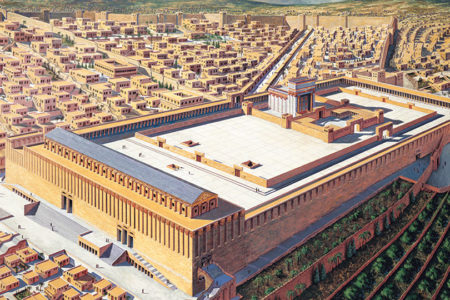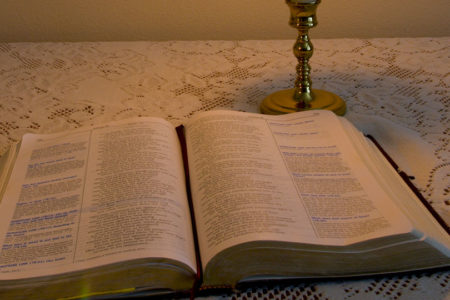Hirsi Ali’s Challenge to Humanity
Ayaan Hirsi Ali is arguably the bravest and most remarkable woman of our time.
To understand why this 37-year-old woman is extraordinary, she must be assessed in the context of the forces pitted against her in her twin struggles to force the Western world to take note of Islam’s divinely ordained enslavement of women, and to force the Islamic world to account for it.
A series of incidents this year placed the forces she battles in stark relief. On May 6, Muslims shot up the Omariyah elementary school in Gaza. One man was killed and six were wounded in the onslaught. The murderers attacked because the UN-run school in Rafah had organized a sports day for the children, in which little boys would be playing with little girls.
The idea that boys and girls might play sports together was too much for the righteous believers. It was an insult to Islam, they said. And so they decided to kill the little boys and girls.
On May 3, in Gujrat, Pakistan, Muslims detonated a bomb at the gate of a girls’ school. Their righteous wrath was raised by the notion that girls would learn to read and write. That too, they felt, is an insult to Islam.
On April 28, U.S. soldiers in Iraq discovered detonation wires across the street from the newly built Huda Girls’ school in Tarmiya, north of Baghdad. They followed the wire to its source and discovered the school had been built as a deathtrap. The pious Muslims who constructed the school had filled propane tanks with explosives and buried them beneath the floor. They built artillery shells into the ceiling and the floor. To save the world for Allah, they decided to butcher little girls.
And the brutality is not limited to the Middle East. In April in Oslo, Norway, Norwegian-Somali women’s rights activist Kadra was brutally beaten by a crowd of men piously calling out “Allah Akhbar.” She was attacked for exposing the fact that inside their mosques in Norway, Norwegian imams praise female genital mutilation in the name of Allah.
Late last year Hirsi Ali published her memoir, Infidel. In describing her own life, what she actually explains are the two competing human impulses: conformity and individualism. In her own life, the clash of the two has been played out on the stage of Islamic ascendance and Western cultural collapse.
Hirsi Ali was born in Somalia to a politically active father who sought to free his country from Said Barre’s Marxist dictatorship. Forced to flee the country with her family, Hirsi Ali’s childhood in Arabia and Africa revolved along the axis of Islamic ascendance at the hand of the Saudi-financed Muslim Brotherhood and Khomeini’s Iran.
Hirsi Ali’s rebellion against Islam was personal, not political. As a young girl and later as a young woman, she found herself abused and stifled by the dictates of Islam just as her youthful spirit wished most to take flight. As a five-year-old in Somalia, she screamed in pain and shock when her grandmother tied her down and had a man with a knife mutilate her genitals.
Living in Saudi Arabia she was struck by the oppressiveness of the “true Islam.” Why, she wondered, were she and her mother and sister prohibited from leaving their apartment without a male relative escorting them? As an adolescent in Nairobi she wondered why the enjoyment she felt in the company of boys was sinful.
Why did her mother need to suffer the humiliation of polygamy? Why could she not choose her own husband? Why was she told by one and all that her normal human impulses to seek love, respect, and compassion and think for herself were sinful and evil?
As she puts it, “I could never comprehend the downright unfairness of the rules, especially for women. How could a just God—a God so just that almost every page of the Qur’an praises his fairness—desire that women be treated so unfairly? When the [Islamic teachers] told us that a woman’s testimony is worth half of a man’s, I would think, Why? If God is merciful, why did He demand that His creatures be hanged in public?”
Her impulse to rebel was matched by her impulse to conform. As a teenager, Hirsi Ali tried to be a faithful Muslim and even joined the Muslim Brotherhood. Embracing the notion of submission she began wearing a full-body burka.
But try as she might, she could not accept that her own will had no inherent value. She blamed the preachers for the terror she saw as a Muslim girl, believing they must be distorting the Qur’an. “Surely,” she writes, “Allah could not have said that men should beat their wives when they were disobedient? Surely a woman’s statement in court should be worth the same as a man’s?”
Yet, when she sat down and read the Qur’an on her own, she found that everything the preachers had said was written in the book.
At 21, Hirsi Ali emancipated herself. Fleeing from an arranged marriage to a Somali immigrant in Canada, she sought and received asylum in Holland. There, she embraced Dutch society and freedoms and quickly flourished in a true rags-to-riches immigrant tale. She learned Dutch fluently and began supporting herself as a translator. In just four years she had bridged the cultural divide between Africa and Europe and began studying political science with the crème de la crème of Dutch society at the University of Leiden.
A mere decade after her arrival, as a naturalized Dutch citizen, she was a public figure, an outspoken social critic of Islam in Europe. In January 2003, she was elected to parliament as a member of the conservative Liberal Party.
In Holland, Hirsi Ali found herself confronted by a kinder, gentler type of cultural tyranny—the moral relativism of political correctness and multiculturalism dictated by the Left. Just as she rejected Islamic oppression in Africa, so in Holland she refused to submit to the will of the majority not to notice, judge, or take action against the misogynist tyranny and anti-Western culture of the Muslim minority.
Hirsi Ali’s labors brought her to Theo Van Gogh. In 2004 the two produced the film Submission, Part One. The short film shows a young Muslim woman wearing a see-through burka. Passages of the Qur’an permitting the abuse of women are written on her body. The woman prays in submission to Allah all the while noting her abject suffering in his name. At the end of the movie, the woman raises her head to Allah and calls into question the reasonableness of her submission.
The film’s provocative message placed both Hirsi Ali and Van Gogh’s lives in imminent danger. And on November 21, 2004, Van Gogh was butchered by a Dutch Muslim on the streets of Amsterdam. The murderer stabbed a letter into Van Gogh’s chest in which he threatened to murder Hirsi Ali “in the name of Allah Most Gracious and Most Merciful.”
While Hirsi Ali was forced to flee her home and live under armed guard in army installations, her message proved too much of a challenge for the Dutch establishment, which vomited her out last year. Her own party found a formality on which to revoke her citizenship and throw her out of the country and the parliament. Although the public outcry that ensued forced the government to restore her citizenship, the message was clear.
Hirsi Ali moved to Washington, D.C. As a fellow at the American Enterprise Institute, she continues to warn the West of the dangers of Islam and of Western cultural disintegration under the tyranny of multiculturalism. In April her work brought an imam from Pittsburgh, Pennsylvania, to call for her murder for the crime of apostasy.
In her life and work, Hirsi Ali personifies the central challenges of our time. She holds a mirror up to the Islamic world and demands that it contend with the evil it propagates in the name of divinity.
She holds a mirror up to the Free World and demands that we defend our freedom against the onslaught of moral relativism and cultural decline.
So, too, she demands our compassion for the women of Islam. She says we must see the suffering beneath the veil and work to alleviate it. Whether it means that we must challenge veiled women to explain why they ascribe to a faith that gives men the divine right to beat and rape women or simply hold Muslim communities in the West to the standards of freedom on which our civilization is based, the West must help these women free themselves from oppression.
Finally, in our own societies, we must protect and uphold voices like Hirsi Ali’s. For the past five years, Hirsi Ali has lived under threat of death for her views.
We must understand that only when she, and people like her, can walk the streets unafraid will we have properly defended our freedom.
This article originally ran in The Jerusalem Post. It has been reprinted by permission.
